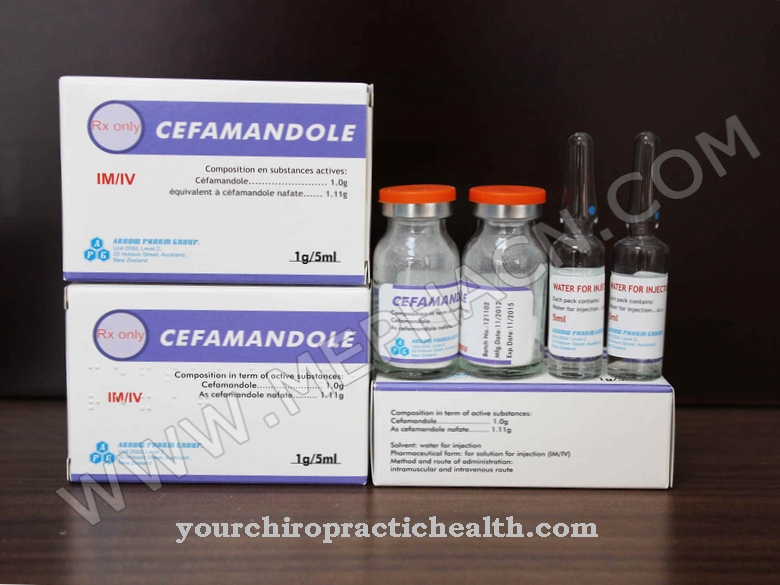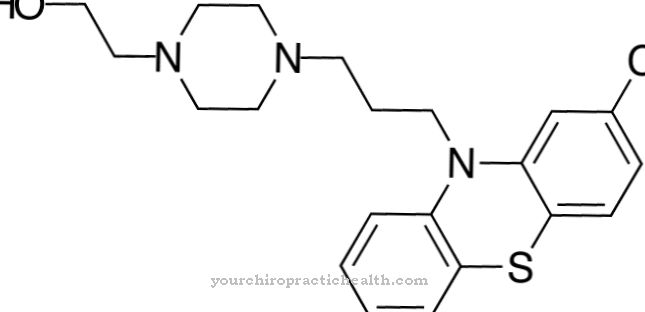Salicylic acid is an aromatic compound with antimicrobial, analgesic, anti-inflammatory, antipyretic and anticoagulant effects. The compound occurs naturally in numerous plant species, but can now also be produced synthetically. The salicylic acid v. a. as the starting substance for the production of aspirin.
What is salicylic acid?

Salicylic acid is a naturally occurring plant ingredient. In chemical nomenclature, salicylic acid is also called ortho-hydroxybenzoic acid. It consists of a benzene ring with a carboxy group and a hydroxyl group.
Since they u. a. obtained from the sparrow, the compound is also known as spiric acid. The product name aspirin is derived from this name.
Medical application, effect & use
Plants form Salicylic acid for their own defense system as an antimicrobial and immunoregulatory agent. In the human organism, salicylic acid not only has an antimicrobial effect, it also has an analgesic, anti-inflammatory, fever-lowering and anticoagulant effect.
It reduces pain and inflammation by intervening in the tissue metabolism: When there is local tissue damage, cells release arachidonic acid. This is enzymatically converted into prostaglandins - these are signal molecules that cause fever, inflammatory reactions and pain. Salicylic acid blocks the enzyme for the conversion of arachidonic acid and thus also the further reaction chain. The British pharmacologist John Robert Vane received the 1982 Nobel Prize for Medicine for his discovery of this blocking mechanism.
Salicylic acid also intervenes in blood clotting via precisely this mechanism of action: To put it simply, blood vessels have to contract and platelets stick together. These processes are also controlled by prostaglandins and thromboxanes. Here too, salicylic acid blocks the synthesis of the signal molecules, so that platelet aggregation is insufficient.
Herbal, natural & pharmaceutical salicylic acid
The positive effects of the Salicylic acid The ancient Greeks and the indigenous peoples of North America already discovered humans: In both cultures, a pain reliever tea was brewed from the bark of willows. Willow extracts are still used in homeopathy today, most commonly for rheumatism, exhaustion, ringing in the ears and deafness.
There are also various chemical forms of administration in conventional medicine: The best-known pharmaceutical application of salicylic acid is aspirin. To make aspirin, salicylic acid is esterified with acetic anhydride to form acetylsalicylic acid (ASA). ASS-containing preparations are u. a. Used against pain, to lower fever, as an anti-inflammatory drug and for thrombosis prophylaxis. Numerous other pain relievers (analgesics) also contain salicylic acid or acetylsalicylic acid.
Salicylic acid can react with bismuth to form bismuth salts - these relieve gastrointestinal complaints such as diarrhea or heartburn. Another field of application is dermatology: In acne therapy, salicylic acid is used as a 5% solution, which combats bacteria and excessive cornification. As a higher-dose solution, it can also dissolve warts and corns. Studies suggest that salicylic acid also prevents various types of cancer.
However, this effect has not yet been sufficiently researched. Salicylic acid is not only used in drugs, but also in the cosmetics industry: Salicylic acid esters are used as colorants and fragrances, e.g. B. bath additives, creams, ointments and perfumes added. They are also found in sun creams as UV filters. In the past, salicylic acid was also often contained in food as a preservative. But this is forbidden nowadays.
You can find your medication here
➔ Medicines for painRisks & side effects
Works in higher doses Salicylic acid toxic. It irritates the skin and mucous membranes and even causes bleeding. It can also cause allergic reactions, acidosis, breathing difficulties and kidney damage.
Inner ear damage is also observed. The anticoagulant effect of salicylic acid, which is used in thrombosis prophylaxis, can be life-threatening in the event of bleeding (e.g. after an accident). Because of the risk of bleeding, drugs containing ASA must not be taken for several days before surgery. Acetylsalicylic acid is considered to be the more tolerated form of administration of salicylic acid, but it too often causes side effects.
Gastrointestinal complaints after chronic oral intake of aspirin or related agents are particularly typical. The gastric mucosa makes prostaglandins to regulate gastric acid secretion. When ASA inhibits prostaglandin synthesis, too much stomach acid is produced. The acid attacks the mucous membrane and leads to inflammation, ulcers and bleeding.
In extreme cases, blood loss in the event of profuse gastric bleeding can even lead to hypovolemic shock and death. With permanent ASA therapy, oral acid blockers can prevent such stomach problems.











.jpg)



.jpg)










.jpg)
